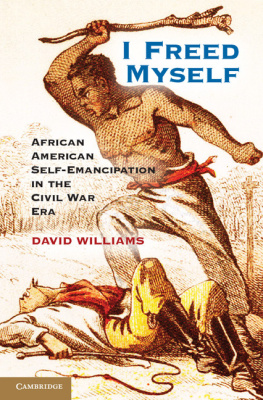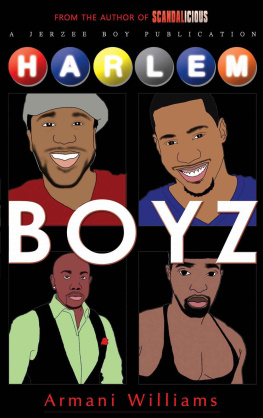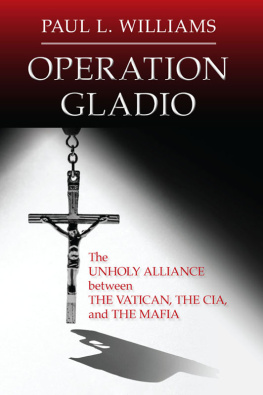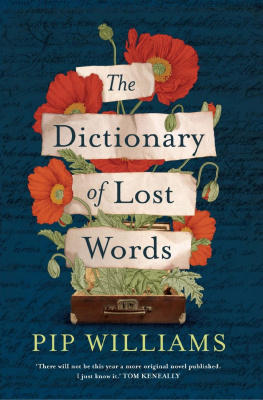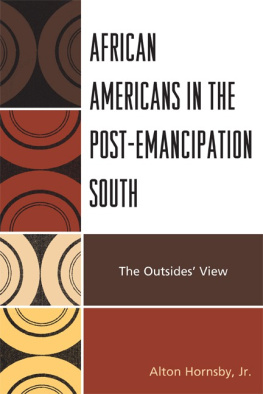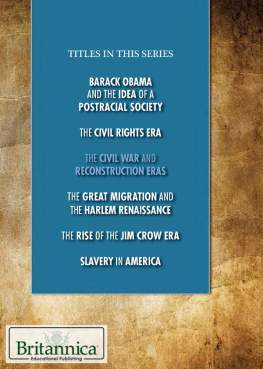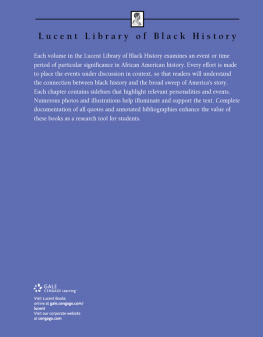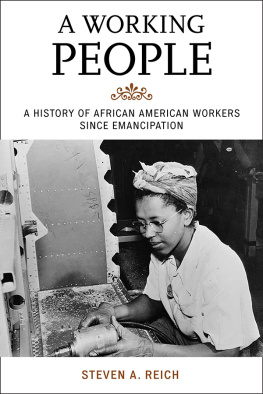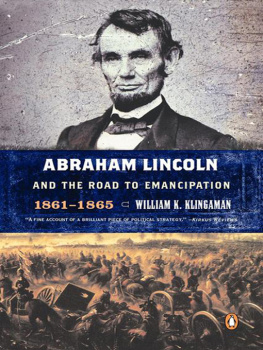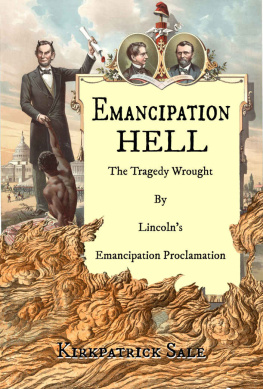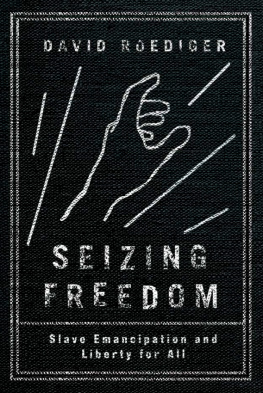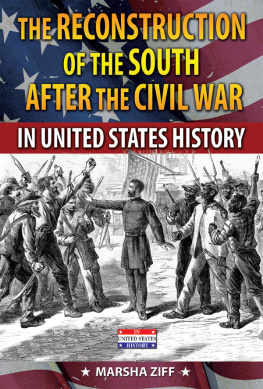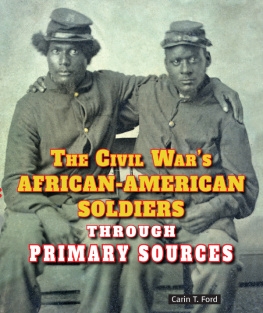Williams - I Freed Myself : African American Self-emancipation in the Civil War Era
Here you can read online Williams - I Freed Myself : African American Self-emancipation in the Civil War Era full text of the book (entire story) in english for free. Download pdf and epub, get meaning, cover and reviews about this ebook. year: 2014, publisher: CambridgeUP, genre: Politics. Description of the work, (preface) as well as reviews are available. Best literature library LitArk.com created for fans of good reading and offers a wide selection of genres:
Romance novel
Science fiction
Adventure
Detective
Science
History
Home and family
Prose
Art
Politics
Computer
Non-fiction
Religion
Business
Children
Humor
Choose a favorite category and find really read worthwhile books. Enjoy immersion in the world of imagination, feel the emotions of the characters or learn something new for yourself, make an fascinating discovery.
I Freed Myself : African American Self-emancipation in the Civil War Era: summary, description and annotation
We offer to read an annotation, description, summary or preface (depends on what the author of the book "I Freed Myself : African American Self-emancipation in the Civil War Era" wrote himself). If you haven't found the necessary information about the book — write in the comments, we will try to find it.
I Freed Myself : African American Self-emancipation in the Civil War Era — read online for free the complete book (whole text) full work
Below is the text of the book, divided by pages. System saving the place of the last page read, allows you to conveniently read the book "I Freed Myself : African American Self-emancipation in the Civil War Era" online for free, without having to search again every time where you left off. Put a bookmark, and you can go to the page where you finished reading at any time.
Font size:
Interval:
Bookmark:

For a century and a half, Abraham Lincolns signing of the Emancipation Proclamation has been the dominant narrative of African American freedom in the Civil War era. However, David Williams suggests that this portrayal marginalizes the role that African American slaves played in freeing themselves. At the Civil Wars outset, Lincoln made clear his intent was to save the Union rather than free slaves despite his personal distaste for slavery, he claimed no authority to interfere with the institution. By the second year of the war, though, when the Union army was in desperate need of black support, former slaves who escaped to Union lines struck a bargain: they would fight for the Union only if they were granted their freedom. Williams importantly demonstrates that freedom was not simply the absence of slavery but rather a dynamic process enacted by self-emancipated African American refugees, which compelled Lincoln to modify his war aims and place black freedom at the center of his wartime policies.
DAVID WILLIAMS is professor of history at Valdosta State University in Georgia, where he specializes in the Civil War era and the antebellum South. He is the author of ten books, including Bitterly Divided: The Souths Inner Civil War and A Peoples History of the Civil War .


For Duncan Winslow
and so many others,
who suffered so much,
and struggled so long,
in so many ways,
to free themselves.
If there is no struggle there is no progress. This struggle may be a moral one, or it may be a physical one, and it may be both moral and physical, but it must be a struggle. Power concedes nothing without a demand. It never did and it never will.
No work of scholarship is a singular effort. Never has that been more true than in this case. Those who contributed in some way to my efforts over the years are far too numerous to list and I thank them all, but a few deserve special recognition for their support of this project.
At Cambridge University Press, Deborah Gershenowitz, senior editor, and Dana Bricken, editorial assistant, offered especially helpful advice and encouragement, as did Eric Crahan, former senior editor. Others associated with the Press who contributed mightily to the project include Sumitha Nithyanandan, Kristine Tobin, Annie Woy, and Shari Chappell.
Also much appreciated is the input of scholars and friends, among them Paul D. Escott of Wake Forest University; Lee W. Formwalt, former director of the Organization of American Historians; Victoria E. Bynum, professor emeritus at Texas State University; Mark D. Hersey of Mississippi State University; Jennifer Hildebrand of the State University of New York at Fredonia; David Carlson of Troy State University; Dixie Ray Haggard of Valdosta State University; and Christopher C. Meyers of Valdosta State University.
A good deal of logistical support came at Valdosta State University, especially from Denise Montgomery, Ramona Ice, Meghan Donathan, and David Funk of Interlibrary Loan; Alan Bernstein, university librarian and dean of the Master of Library and Information Science Program; Deborah Davis and Stacey Wright of Archives and Special Collections; and Rex Devane of the Media Center. Further direct support in the way of both time and funding came with help from Paul Riggs, head of the Department of History; Jay Rickman, chair of the departments scheduling committee; Connie Richards, dean of the College of Arts and Sciences; Alfred Fuciarelli, former assistant vice president for research and dean of the Graduate School; James LaPlant, assistant vice president for research and dean of the Graduate School; and the VSU Graduate Faculty Scholarship Fund.
A very special thanks goes to Leonard L. Winslow, who graciously provided a photograph of his great-grandfather, Duncan Winslow, along with other information and documents dealing with the familys American journey, as Leonard so aptly put it.
Finally, I would like to extend my most affectionate gratitude to my wife, Teresa Crisp Williams, who read early versions of the manuscript and has been a constant pillar of support throughout.
Duncan Winslow escaped from slavery in Tennessee during the Civil War and eventually joined the Union army. April of 1864 found him along the Mississippi River with the Sixth U. S. Heavy Artillery defending Fort Pillow, Tennessee, from attack by General Nathan Bedford Forrest and his Confederate cavalry. Outnumbered nearly four to one, the defenders were quickly overwhelmed. As rebel troops overran the fort, Winslow and his comrades threw down their arms and tried to surrender, but Forrests men took few prisoners. In what came to be known as the Fort Pillow Massacre, Confederates slaughtered nearly 300 of their captives, most of them former slaves. To rebel officers shouts of Kill the God damned nigger, Winslow was shot in his arm and thigh. In the confusion, he managed to escape by crawling among logs and brush, hiding there until the enemy moved on. When darkness fell, Winslow made his way down to the riverbank and boarded a federal gunboat.
Font size:
Interval:
Bookmark:
Similar books «I Freed Myself : African American Self-emancipation in the Civil War Era»
Look at similar books to I Freed Myself : African American Self-emancipation in the Civil War Era. We have selected literature similar in name and meaning in the hope of providing readers with more options to find new, interesting, not yet read works.
Discussion, reviews of the book I Freed Myself : African American Self-emancipation in the Civil War Era and just readers' own opinions. Leave your comments, write what you think about the work, its meaning or the main characters. Specify what exactly you liked and what you didn't like, and why you think so.

